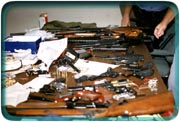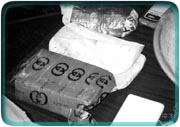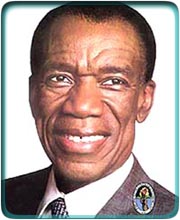
Lock, stock and dozens of loaded barrels: A cache of weapons from suspected drug dealers.
July 27–August 3, 2000
cover story
 |
|
|
Lock, stock and dozens of loaded barrels: A cache of weapons from suspected drug dealers. |
|
by Howard Altman and Jim Barry
page 1 | page 2 | page 3 | page 4
Feb. 1, 1996.
"P-Man", wearing a body recorder, transmitter and receiver, attended the PRD meeting and, at the end of two hours of general conversation, recorded one party member stress the importance of keeping drug deals on the sly.
"We need to keep those rumors down," said an unknown speaker. "Once President Pena Gomez wins the election, it doesn’t matter about the rumors. We have to keep rumors from coming out to protect Pena Gomez."
A bit later, the conversation picked up by the recorder strapped to "P-Man"’s body must have made the informant just a little nervous.
"Members should denounce rumors and be careful of people making links to the party and taking pictures and making recordings connected to drug trafficking."
Two weeks later, "P-Man" returned to PRD headquarters and discovered two major new wrinkles in the case.
Pena Gomez was currently in Miami, traveling with five to six bodyguards, according to a memo filed the next day by McLaughlin.
And a PRD mahaff from New York was at the meeting, with news that Pena Gomez was looking to take home more than a half million dollars at a big New York fundraising event called "The Grand Reunion."
"Fiquito Vasquez, who identified himself as the coordinator from New York… stated that Pena Gomez is going to be traveling to the different local chapters of the PRD on the East Coast between the 1st and 4th of March and will be at the Concord Hotel the night of March 4th, 1996, where $550,000 will be given to Pena Gomez from the funds collected. Pena Gomez will leave for the Dominican Republic on March 5th, 1996."
The presence of Fiquito Vasquez in Philadelphia meant that the PRD’s fundraising efforts extended beyond Philadelphia and Worcester. McLaughlin contacted DEA officials in New York, who visited Philly on Feb. 28, 1996 to share information and coordinate efforts to stop the PRD’s alleged drug smuggling operations.
DEA special agents Richard Mulholland, John Powell from New York and Matt Hackett from the Philadelphia office met with McLaughlin and Sunderhauf at 1 p.m. at BNI headquarters on Essington Avenue. New York DEA agents were brought up to speed about visits by Bernardo Paez and Fiquito Vasquez to Philadelphia, urging PRD members to raise money and avoid getting caught selling drugs.
In a March 7, 1996 memo, New York DEA agent Mulholland outlined his view of the significance of BNI’s findings.
"U.S. sources are looking for a connection between Pena Gomez and the monies obtained from drug sales by PRD members," wrote Mulholland. "Current U.S. policy favors democratic elections and has no objections to a presidential win by Pena Gomez and the PRD. If solid connections can link Pena Gomez to the illegal money, this would impact the position of support for Pena Gomez taken by the U.S. Government. The American Embassy indicated to BNI that the Dominican Drug Control Directorate has photographed Pena Gomez in the company of known narcotics traffickers."
By early March, the BNI learned that Pena Gomez had twice changed his plans, that local party officials had not raised enough money, so he was putting off his trip until the end of the month.
In New York, DEA special agent Richard Mulholland wrote a memo on March 14 outlining that Bernardo Paez, the New England PRD chapter leader, Pedro Corporan, who had given $2 million in drug money to a DEA undercover sting operation and Daniel Croussett, the Philly PRD party official, were among the targets of a massive combined DEA-BNI investigation.
The investigation’s objectives, according to Mulholland, included additional surveillance and the purchase and seizure of "large amounts of heroin in order to identify the sources of supply and distribution networks that are used to fund the PRD and the presidential campaign of Pena Gomez."
Meanwhile, BNI officers continued working the streets, taking nearly $130,000 worth of heroin from a house on the 1200 block of Luzerne Street on March 4. Two weeks later, a confidential informant delivered a list of local party members to the BNI.
One week after the squad was given those names, the CIA paid a visit to Essington Ave.
 |
|
|
Gucci, gucci goo: Illegal drugs wrapped in designer logo. |
|
Lawrence wanted the tapes made by the Bastard Squad’s informants of meetings at which PRD members discussed drug sales.
Lawrence, according to McLaughlin’s diary, also wanted the return of Leightley’s memo of Jan. 31, wherein the CIA agent discussed the current status of the Dominican election.
Lawrence, according to McLaughlin’s diary, told Sunderhauf that the BNI was not supposed to have that memo.
Lawrence had one more, very ominous request.
The CIA wanted biographical information on the Bastard Squad’s informants.
Fearing for the lives of their informants, McLaughlin and Micewski refused to give the CIA that information.
For the Bastard Squad, a very strange day was about to get stranger.
With CIA agent Lawrence in the room, McLaughlin received a call from DEA in New York.
Head north quickly, said the DEA, and bring your confidential informants.
Pena Gomez was coming to town.
En route to New York, McLaughlin was paged by Special Agent Don Hanson of DEA in New York.
The Bastard Squad was to go directly to Kennedy International Airport and await the arrival of Pena Gomez.
When they got there, the BNI investigators and their coterie of informants were surprised to learn they would not have access to the candidate.
Someone had called in a last-minute death threat against Pena Gomez, which meant that the New York City Police Department’s visiting dignitary unit had Pena Gomez’s arrival at Kennedy cordoned off.
DEA agents, posing as photographers, tried to get some surveillance photos of Pena Gomez, but were too far away, so they shut down the operation for the night in anticipation of seizing the campaign funds the following night at the fundraising event, "The Grand Reunion," to be held at the Concord Hotel.
 |
|
|
The candidate: The late Jose Francisco Pena Gomez. |
|
At 8:30 p.m., Pena Gomez arrived at PRD headquarters in New York. Within 20 minutes, the BNI informant arrived and quickly left, telling the DEA undercover agents that they would have no trouble gaining access to the meeting.
At 10:15 p.m., the BNI’s confidential informant reported that the Philadelphia chapter of the PRD brought $10,000 to the fundraising event. The informant observed "approximately 50 people standing in line and 30 of these people were carrying bags that contained currency. Different chapters were called into a side room where they turned in their money," according to a memo filed by McLaughlin on April 1, 1996.
By now, the Bastard Squad was ready to move in and seize the money.
But at the last minute, plans changed and DEA told McLaughlin, whose agents did not have jurisdiction in New York, that Pena Gomez was to be allowed to leave the country with the money.
That was only the beginning of the bad news for the Bastard Squad.
Two weeks later, U.S. Attorney Michael Stiles met with state Attorney General Tom Corbett — McLaughlin’s boss.
The U.S. Attorney’s Office would no longer take BNI cases investigated by Sparky McLaughlin, Charlie Micewski and Dennis McKeefery.
The District Attorney’s Office quickly followed suit.
And, though they continued to probe Pena Gomez and the PRD, the Bastard Squad was essentially out of business, no longer allowed to work the streets as narcotics investigators.
Why did prosecutors shut down the Bastard Squad?
Why did Lynne Abraham's office in essence hand out "Get Out of Jail Free" cards to dozens of Dominicans with prior drug-dealing convictions?
And why did Al Gore show up at a fundraiser attended by PRD members under investigation by the DEA for money laundering and narco-trafficking?
Direct access from your IP location 1622147653 is not permitted - Please contact the administrator for access